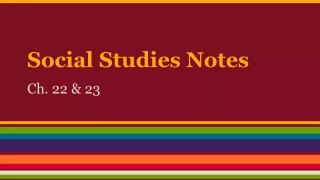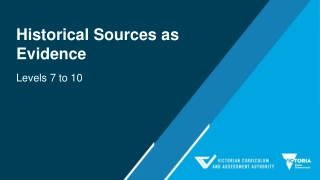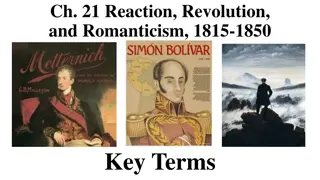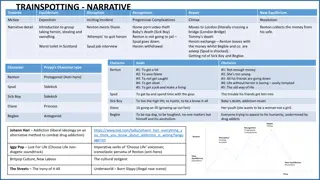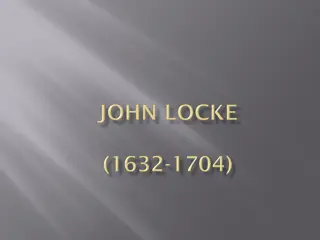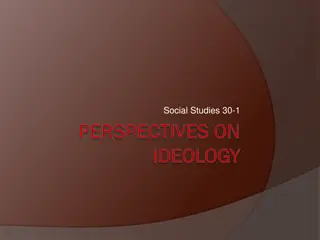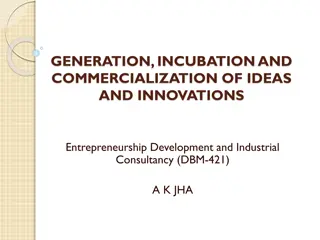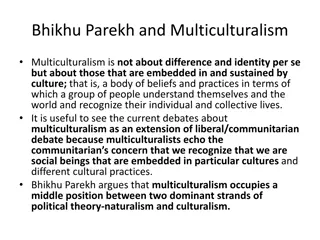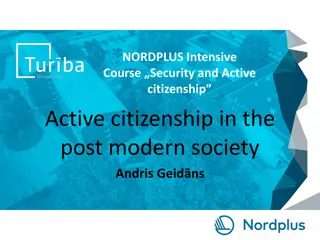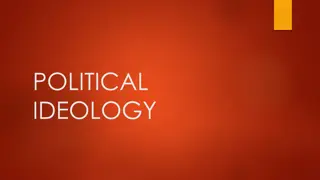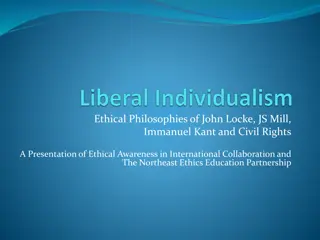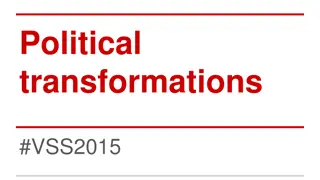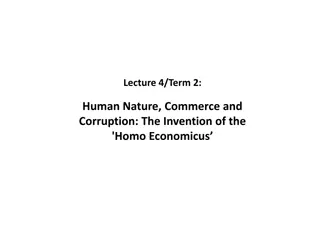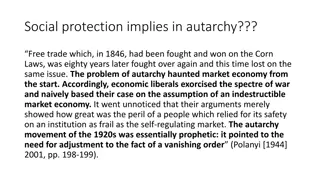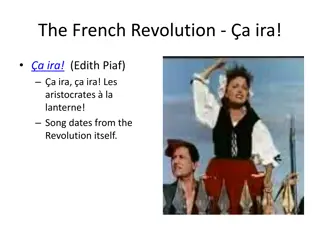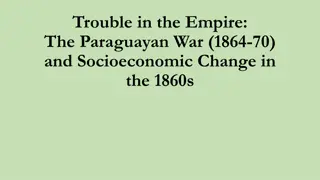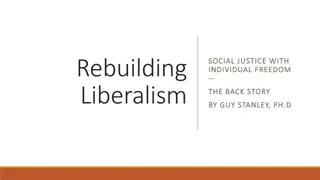Understanding Liberalism: Key Ideas and Historical Context
Liberalism, a prominent political ideology, emerged in the 19th century and is closely linked to capitalism. It stands against absolutism and feudal privileges, advocating for individualism, freedom, reason, equality, toleration, consent, and constitutionalism. The evolution of liberalism emphasized representative government, constitutionalism, and a laissez-faire economy. It serves as a foundational ideology that shapes political discourse and societal development.
Download Presentation

Please find below an Image/Link to download the presentation.
The content on the website is provided AS IS for your information and personal use only. It may not be sold, licensed, or shared on other websites without obtaining consent from the author. Download presentation by click this link. If you encounter any issues during the download, it is possible that the publisher has removed the file from their server.
E N D
Presentation Transcript
There are three classical theories one will find in political thought or ideas or ideology. These are: Liberalism, Conservatism and Socialism A few comments of these three is in order. It is important to note that the three started while there was a transition from feudalism to industrial capital, as a way of providing ideologies for shaping emerging industrial societies. Also, there was the need to shape economic philosophies. This means that there was the need to give focus to ideas that will underpin or inform the economy. Thus, at this time the development of political ideology had strong economic focus. There was the battle between capitalism and socialism. The capitalist West confronted the socialist East
Liberalism as a political idea emerged as a developed political creed in the early 19th century. However, it is a political idea which has been developing in the past 300 years. Liberalism is linked to capitalism and is a guiding ideology for the middle class. Liberalism is the appropriate ideology that one should start the examination of ideologies or political ideas from Liberalism is a meta-ideology. It is a higher or second-order ideology that lays down the grounds on which ideological debate can take place. This means it can serve as the seed around which further thought grows
At its onset, liberalism rejects absolutism. Absolutism is the political doctrine and practice of unlimited centralized authority and absolute sovereignty, as vested especially in a monarch or dictator. Liberalism, at the onset also rejects feudal previleges. Feudalism was the dominant social system in medieval Europe, in which the nobility held lands from the Crown in exchange for military service, and vassals were in turn tenants of the nobles, while the peasants (villeins or serfs) were obliged to live on their lord's land and give him homage, labour, and a share of the produce, notionally in exchange for military protection.
Further development of the idea of liberalism then inculcated the need for representative government and constitutionalism and a laissez-faire economy (an economic system in which transactions between private parties are absent of any form of government intervention such as regulation, privileges, imperialism, tariffs and subsidies).
Key Ideas of Liberalism The following are the key ideas informing Liberalism 1. Individualism 2. Freedom 3. Reason 4. Equality 5. Toleration 6. Consent 7. Constitutionalism
Individualism: Individualism (see p. 179) is the core principle of liberal ideology. It reflects a belief in the supreme importance of the human individual as opposed to any social group or collective body. Human beings are seen, first and foremost, as individuals. This implies both that they are of equal moral worth and that they possess separate and unique identities. The liberal goal is therefore to construct a society within which individuals can flourish and develop, each pursuing the good as he or she defines it, to the best of his or her abilities. This has contributed to the view that liberalism is morally neutral, in the sense that it lays down a set of rules that allow individuals to make their own moral decisions.
Freedom: Individual freedom (see p. 302), or liberty (the two terms are interchangeable), is the core value of liberalism; it is given priority over, say, equality, justice or authority. This arises naturally from a belief in the individual and the desire to ensure that each person is able to act as he or she pleases or chooses. Nevertheless, liberals advocate freedom under the law , as they recognize that one person s liberty may be a threat to the liberty of others; liberty may become licence. They therefore endorse the ideal that individuals should enjoy the maximum possible liberty consistent with a like liberty for all.
Reason: Liberals believe that the world has a rational structure, and that this can be uncovered through the exercise of human reason and by critical enquiry. This inclines them to place their faith in the ability of individuals to make wise judgements on their own behalf, being, in most cases, the best judges of their own interests. It also encourages liberals to believe in progress and the capacity of human beings to resolve their differences through debate and argument, rather than bloodshed and war
Equality: Individualism implies a belief in foundational equality: that is, the belief that individuals are born equal , at least in terms of moral worth. This is reflected in a liberal commitment to equal rights and entitlements, notably in the form of legal equality ( equality before the law ) and political equality ( one person, one vote; one vote, one value ). However, as individuals do not possess the same levels of talent or willingness to work, liberals do not endorse social equality or an equality of outcome. Rather, they favour equality of opportunity (a level playing field ) that gives all individuals an equal chance to realize their unequal potential. Liberals therefore support the principle of meritocracy, with merit reflecting, crudely, talent plus hard work.
toleration Toleration: Liberals believe that toleration (that is, forbearance: the willingness of people to allow others to think, speak and act in ways of which they disapprove) is both a guarantee of individual liberty and a means of social enrichment. They believe that pluralism (see p. 101), in the form of moral, cultural and political diversity, is positively healthy: it promotes debate and intellectual progress by ensuring that all beliefs are tested in a free market of ideas. Liberals, moreover, tend to believe that there is a balance or natural harmony between rival views and interests, and thus usually discount the idea of irreconcilable conflict.
Consent: In the liberal view, authority and social relationships should always be based on consent or willing agreement. Government must therefore be based on the consent of the governed . This is a doctrine that encourages liberals to favour representation (see p. 219) and democracy, notably in the form of liberal democracy (see p. 89). Similarly, social bodies and associations are formed through contracts willingly entered into by individuals intent on pursuing their own self-interest. In this sense, authority arises from below and is always grounded in legitimacy (see p. 80).
Constitutionalism: Although liberals see government as a vital guarantee of order and stability in society, they are constantly aware of the danger that government may become a tyranny against the individual ( power tends to corrupt (Lord Acton)). They therefore believe in limited government. This goal can be attained through the fragmentation of government power, by the creation of checks and balances amongst the various institutions of government, and by the establishment of a codified or written constitution embodying a bill of rights that defines the relationship between the state and the individual.
The Two Forms of Liberalism There are two types of liberalism The first is Classical Liberalism The Second is Modern Liberalism
Classical Liberalism This form of liberalism lays emphasis on the extreme understanding of individualism. There is the belief that that humans are egoistic and egotistic, self-centred, self-seeking, and self-reliant creatures. In this extreme form, humans are people who nothing to society or other individuals. There is the belief in negative liberty. This is the belief in non- interference in human freedom, or the absence of external constraints on human freedom Thus, government is to be minimal having no interference in constraining human wants and actions.
Government is to exist to enforce contract, establish order and security and do no more other than ensuring that it protects citizens from the encroachment of other citizens There is deep faith in free market, which is not regulated by government. this is due to the belief that unregulated free market is a sure guarantee of prosperity
Modern Liberalism There is the evil of classical liberalism. This is traceable to the fact that some other forms of injustice and exploitation were created from its notion of the free market Modern Liberalism is more relaxed in relation to with state intervention There is faith in big government rather than minimal government.
Positive Freedom is what informs Modern Liberalism. This has to do with government doing something to aid the individual s notion of freedom. Freedom is linked to personal development and the flourishing of individual State intervention and provision of social welfare is encouraged so that the individual can achieve his potentials. This is to be given to the weak and the vulnerable


